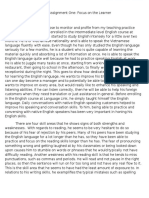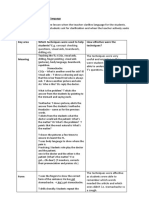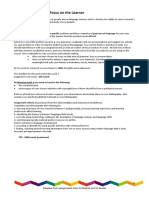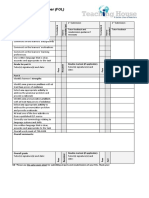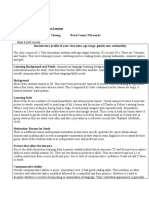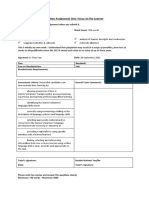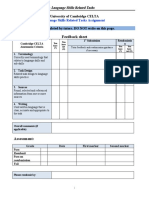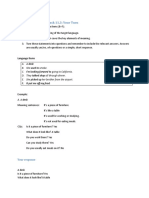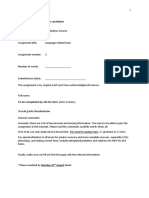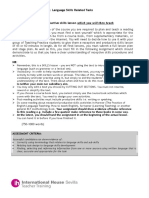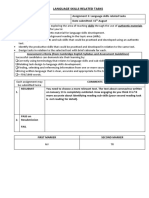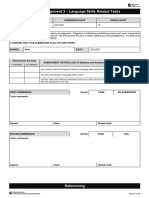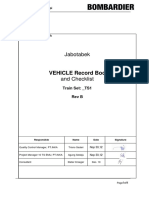Authentic Materials Assignment
Uploaded by
Vicki Jade StevensonAuthentic Materials Assignment
Uploaded by
Vicki Jade StevensonVicki Jade Stevenson
Authentic Materials For my authentic materials lesson I choose to use Lonely Planet travel guides as my authentic material. I thought I would use these to review the future form going to and practice travel vocabulary. I choose to do this because these were topics that had already been visited in the course book (Headway Intermediate students book, p39,43, 65) and I also thought this topic would be relevant to the learners as they would all have some experience at planning and making a journey at some time in their past. The vocabulary would also be useful for them when planning their trip home or their next holiday. I was also able to incorporate a writing task into this lesson which was a skill they had been lacking practice in over the past few weeks. I choose to use receptive skills to prepare for my main productive skills task. As these skills were only to be used in preparation for the main task I decided to use tasks that involved using skimming and scanning techniques. We use skimming to identify main ideas in a text without having to read the text word by word. I got the students to use this technique by giving them an itinerary for an imaginary holiday I had planned, to assist the class in preparing for their own. The aim of this task was for students to identify things we need to plan for when we are going on holiday. The ideas I hoped that they would extract from the text were accommodation, means of transport, location and sights to visit or people to meet. Scanning is used to identify key words or ideas in texts and involves looking quickly through a text for specific information. Students were asked to use this technique by scanning through a travel guide to find location, means of transport, accommodation and sights to visit in a trip they were planning. For this activity I asked students in groups to choose 3 locations in the country of the travel guide they had been provided with. They then had to find the ways they would travel to and from these locations, where they would stay and one sight to visit in each location. The aim of this activity was to provide a skeleton for the writing activity that followed. I used skimming and scanning because the use of these kinds of techniques can help the learner to improve their reading comprehension and take in the foreign language. Grellet comments on this One of the most important points to keep in mind when teaching reading comprehension is that there is not one type of reading but several ... Students will never read efficiently unless they can adapt their reading speed and technique to their aim when reading. By reading all texts in the same way, students would waste time and fail to remember points of importance to them because they would absorb too much. (Gellet 1981:17)
Vicki Jade Stevenson
The main aim of my lesson involved using productive language skills as I decided to focus on writing as the main skill in my lesson. To prepare for the final task I asked students in their groups to write down the information I had asked for in their scanning task. To assist them I provided them with a handout to remind them of the information they were looking for in the travel guide their group had been given. Doing the task in this way meant that they were gathering information (from the travel guide) and ordering it in a manner that it could be used as a draft for their final writing task. Harmer suggests the importance of students planning what they are going to write we will want to involve them in the process of writing. In the real world this typically involves planning what we are going to write, drafting it, reviewing and editing what we have written then producing a final version... We need to encourage students to plan, draft and edit... By doing so, we will help them to be better writers. (Harmer 2007: 113)
Once students had completed the scanning and produced a draft for their writing I set them the main writing task. The aim of this task was for students to write a travel itinerary for a holiday in the future. They were told to use the information they had gathered as a group as the draft and to complete this task individually. At the end of this task I took away the pieces of work for marking. These pieces of written text prove that I met the aims of my lesson and are included in the final part of this assignment together with a lesson plan that clearly explains the aims of this lesson. Once I collected the writing I preceded to marking them using a correction code I devised after obtaining ideas for Tricia Hedges book Writing (pg 152). My correction code can also be found at the end of this assignment. Correction codes are a great way to get students to think about their mistakes, and to get them to have another go at getting them correct. When correcting writing however it is important not to over correct as students can become demotivated. It is best to focus on correcting the target language only if too many errors have occurred. In a perfect world, if time allowed I would have asked students to try and correct their errors and produce a final draft of their writing.
In my authentic materials lesson I have achieved successfully integrating a wide range of skills. As well as the skills already mentioned, I integrated grammar by focusing on the future form going to and speaking by putting the students into pairs at the end of the lesson to discuss the holidays they had planned. The feedback and personal assessment of this lesson will help me to address the strengths and weaknesses of my integrated skills lesson and assist
Vicki Jade Stevenson
me in reflecting on these and producing better integrated skills lessons in the future. My choice of authentic material was one that could have caused difficulty for the students. But by breaking the lesson down and giving clear instructions I made it accessible to the students and clearly met my lesson aims.
Bibliography: Grellet,F. (1995) Developing Reading Skills. Cambridge, Cambridge University Press. Harmer, J (2007) how to teach english. Essex, Pearson Education Limited. Hedge, T (1997) Writing. Oxford, Oxford University Press.
Authentic Materials: Lonely Planet: Brazil (2008). London, Lonely Planet Publications Ltd. Lonely Planet: India (2007). London, Lonely Planet Publications Ltd. Eyewitness Travel: Japan (2009) London. DK.
You might also like
- Celta Assignment 1 - Language Related TasksNo ratings yetCelta Assignment 1 - Language Related Tasks10 pages
- CELTA Online Unit 2 Task 13 - Designing TasksNo ratings yetCELTA Online Unit 2 Task 13 - Designing Tasks2 pages
- Clarifying Language - Celta Observation TaskNo ratings yetClarifying Language - Celta Observation Task3 pages
- Celta Course Lesson Plan: Grammar and SpeakingNo ratings yetCelta Course Lesson Plan: Grammar and Speaking5 pages
- Assignment 2 - Language Analysis and Meaning83% (6)Assignment 2 - Language Analysis and Meaning9 pages
- CELTA Language Analysis Sample 1 Lexis Abroad100% (1)CELTA Language Analysis Sample 1 Lexis Abroad1 page
- Nino Ivanidze Focus On The Learner New Part 20% (1)Nino Ivanidze Focus On The Learner New Part 28 pages
- CELTA Written Assignment: Focus On The Learner-EXAMPLENo ratings yetCELTA Written Assignment: Focus On The Learner-EXAMPLE4 pages
- CELTA Assignment 2 Focus On The LearnerNo ratings yetCELTA Assignment 2 Focus On The Learner10 pages
- Focus On The Learner: CELTA - Written Assignment 1No ratings yetFocus On The Learner: CELTA - Written Assignment 16 pages
- Assignment 3 LSRT - MiguelLaricoCondori - To CompleteNo ratings yetAssignment 3 LSRT - MiguelLaricoCondori - To Complete12 pages
- CELTA Online Unit 8 Task 11-3 - Your TurnNo ratings yetCELTA Online Unit 8 Task 11-3 - Your Turn3 pages
- Cambridge Celta Written Assignment 2: Focus On The LearnerNo ratings yetCambridge Celta Written Assignment 2: Focus On The Learner4 pages
- Vespasiano - TP 4 Lesson - Plan - Form4weekand Part-TimeNo ratings yetVespasiano - TP 4 Lesson - Plan - Form4weekand Part-Time6 pages
- Assignment 3 Language Skills Related TasNo ratings yetAssignment 3 Language Skills Related Tas4 pages
- Teaching English Abroad: All Things TEFL for Native and Non-native English TeachersFrom EverandTeaching English Abroad: All Things TEFL for Native and Non-native English TeachersNo ratings yet
- Letter Boxing: What Is Billy Doing? Billy Is Eating A SandwichNo ratings yetLetter Boxing: What Is Billy Doing? Billy Is Eating A Sandwich3 pages
- Ioan Humphreys Introduction To Health Economics in The UKNo ratings yetIoan Humphreys Introduction To Health Economics in The UK2 pages
- Cambridge English Proficiency Writing Part 1100% (1)Cambridge English Proficiency Writing Part 17 pages
- Real Life Upper Intermediate Progress Test 1 2014No ratings yetReal Life Upper Intermediate Progress Test 1 20143 pages
- Real Life Upper Intermediate Progress Test 10% (2)Real Life Upper Intermediate Progress Test 13 pages
- Onset of Word Form Recognition in English andNo ratings yetOnset of Word Form Recognition in English and10 pages
- Mina Petrila-Spatiu Exterior 2 - 14 03 2024-ModelNo ratings yetMina Petrila-Spatiu Exterior 2 - 14 03 2024-Model1 page
- Mobile Shop Management System Python _ PDF _ Software Testing _ Relational DatabaseNo ratings yetMobile Shop Management System Python _ PDF _ Software Testing _ Relational Database88 pages
- Performance Assessment and Review Admin and Accounts ManagersNo ratings yetPerformance Assessment and Review Admin and Accounts Managers3 pages
- Distance Learning and Effect On Practical Skills Courses in BTVTED of ZCSPCNo ratings yetDistance Learning and Effect On Practical Skills Courses in BTVTED of ZCSPC12 pages
- Bhaktivedanta_Vidyapitha_SB_Canto_10_OverviewNo ratings yetBhaktivedanta_Vidyapitha_SB_Canto_10_Overview208 pages
- Determination 446 Pesticides Residue by GC Ms and LC MsNo ratings yetDetermination 446 Pesticides Residue by GC Ms and LC Ms32 pages
- Differential geometry of manifolds Second Edition Lovett 2024 scribd downloadNo ratings yetDifferential geometry of manifolds Second Edition Lovett 2024 scribd download55 pages
- Chapter Three Chapter Three The Multiple Linear Regression (MLR)No ratings yetChapter Three Chapter Three The Multiple Linear Regression (MLR)50 pages
- Brand Awareness & Preference Regarding Havells Green CFL PDF100% (1)Brand Awareness & Preference Regarding Havells Green CFL PDF74 pages

